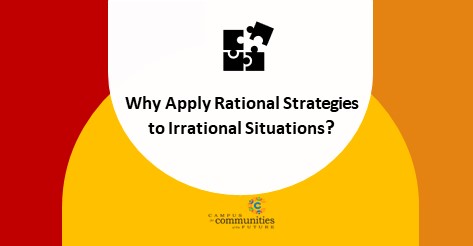Why Are We Applying Rational Strategies to Irrational Situations?

While my intention is never to annoy others, I know I sometimes do.
When I was working in bureaucratic settings, I’d go to meetings and say something that would inevitably draw puzzled looks from others. It was almost as if I were speaking in a foreign language. After shaking their heads, the other participants would continue their previous line of conversation – typically one that involved a lot of detail. After being ignored for the rest of the meeting I’d beat myself up thinking, “Why on earth couldn’t I just learn to keep my mouth shut?”
Maybe it’s because I’m getting older, but today I’m more willing and able to speak up during meetings, accepting that it’s not likely that everyone will fully understand, or perhaps even care, about the big picture strategies and solutions I’m trying to convey.
Although I’m not as concerned about what people think about me anymore, sadly there still doesn’t seem to be much patience with people like me who see the whole forest but aren’t as good as they are at getting to the facts about the trees.
Trust me, I very much get that I’m not as good as others with the details but why are those left-brain abilities the ones more apt to be valued? Surely it must be clear that if we only discuss and debate the trees, we are at risk for losing sight of the forest. After all, there are many times when we have all the facts and details yet still don’t get a good grip on the big picture because we dismissed or didn’t pay attention to those bringing more of the right brain, big picture thinking, and intuition.
The truth is we need both.
There seem to be those who are simply wired to see systems, patterns, and paths in the forest often before they’re visible to others. And, while our language has many words for describing detail and the information we gain from our five senses, we don’t have a lot of words to describe this six-sense intuition.
Instead, we’re more likely to respect and value the people who are good at linear thinking and reporting facts, and what research can prove. It’s not an unexpected bias given that experts suggest between two-thirds and three-quarters of the general population prefer factual over intuitive data.
This bias means we’re not as likely to value intuition and are instead more apt to attribute it to a lucky guess or brush it off as “women’s intuition”. We’re much more comfortable with what we can prove by what we can see, hear, touch, or measure.
However, it is increasingly evident, today’s complex environments need both types of knowing – fact based and intuitive.
Intuitive-knowing comes far easier to me than that which is fact-based. And yet, I’ve spent an inordinate amount of time, over many years, honing my fact-based knowing in order to pass muster. However, I’ve always wondered what it would be like if those who are instead rooted in the concrete of details, spent more time developing their intuition?
Today, intuition is of critical importance because we’re operating in an unpredictable environment dealing with complex interlinked challenges and opportunities.
Applying rational methods in an irrational world just doesn’t seem to be the best solution. If we attempt to hang on to rationality as the only basis for our decision-making, we may lose the window of opportunity for the action needed now.
The good news is that there seems to be a growing recognition that the old ways and the old rules may not always work. Yet, many still see traditional fact-based decision-making as the only answer.
Intuitive leadership is less about facts and more about knowledge, character, experience, and wisdom. It is much more about asking the question, “What do we need to do to make a difference” and then trusting our gut reaction to the answer.
Posted on 08-23-23Next entry: Is Bigger Always Better?
Previous entry: Complexity Stalls Action

 Brenda Herchmer is the owner of Grassroots Enterprises, a community development consulting company.
Brenda Herchmer is the owner of Grassroots Enterprises, a community development consulting company.